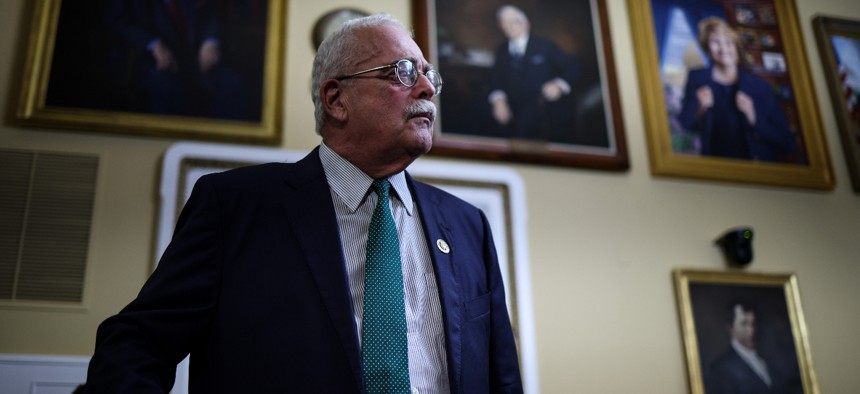
Rep. Gerry Connolly, D-Va., said he was "disappointed" the House Oversight and Accountability Committee's IT subcommittee once again opted not to hold a hearing on the new FITARA scorecard. Anna Moneymaker/Getty Images
Agencies contend with new metrics, another missing hearing for IT acquisition reform
Cracks are showing in the usual, bipartisan buy-in for oversight on 2014 Federal IT Acquisition Reform Act progress.
Agencies have new grades for their implementation of IT goals under the 2014 Federal IT Acquisition Reform Act. Rep. Gerry Connolly, D-Va., released the latest iteration of the biannual FITARA scorecard on Thursday.
As with the sixteenth scorecard released last fall, the new scorecards were reviewed in a roundtable discussion rather than the usual hearing — something Connolly says is because of a lack of Republican support.
“I want to mention at the beginning how disappointed I am that some of the Republican majority has turned its back on the FITARA scorecard,” he said during the roundtable on Thursday, touting the scorecard as a successful oversight mechanism that’s yielded real savings for the government by pushing agencies to close data centers, use working capital funds for IT modernization and more.
Data center efforts and oversight on duplication in agency IT portfolios has yielded upwards of $30 billion in savings, according to Government Accountability Office IT and Cyber Director Carol Harris.
The new scorecard included one A; 10 B’s; 10 C’s and three D’s — a notable drop from last fall, where no agency scored below a C — but it’s difficult to compare the new scores with prior ones because of this iteration’s updated methodology, said Harris, noting that her agency worked with Connolly’s staff on the scorecard.
Among the changes are a new cloud computing category to track cloud adoption and replace the data center consolidation category, said Connolly. A forthcoming GAO report will look into how well agencies are complying with Office of Management and Budget guidance on cloud, he said, and the new scorecard uses GAO’s preliminary findings.
One of the issues GAO is examining is the implementation of OMB requirements for service-level agreements in cloud deployments, which has been uneven, said Harris.
The new scorecard also introduces a “progress tracker,” meant to give agencies more transparency into the data that informs the scores and track how agencies are doing on key goals like data center consolidation, said Connolly.
“The tracker will enable Congress and the American people to see that while progress has been made in sunsetting various categories, there is critical value in monitoring an agency's ability to sustain high levels of progress while taking on new and evolving and new challenges,” said Harris, pointing to a recent GAO report on software licensing as an example of when issues get less oversight and agencies backslide in their progress.
Some agency representatives at the roundtable said that the oversight from FITARA has helped them in their efforts.
“The FITARA scorecard is one of the important tools we use to assess the effectiveness of our efforts. The FITARA scorecard helps us assess how well our agency is managing IT to meet the requirements of our mission,” said Jonthan Feibus, chief information security officer of the U.S. Nuclear Regulatory Commission.
As for what’s next for this oversight effort dating back to 2015, “I hope we can soon return to the traditional, bipartisan, biannual oversight hearing cadence of the FITARA scorecard that we were promised a year ago this month,” said Connolly.
“Nancy Mace won’t have one,” Connolly told Nextgov/FCW when asked why there wasn’t a hearing, referring to his Republican counterpart who chairs the House Oversight and Accountability Committee’s cybersecurity, IT and government innovation subcommittee.
“They strung us along, and here we are now in the second session of the Congress — zero commitment to an oversight hearing on something I think is pretty important and that has always had a strong Republican partner,” said Connolly. “It’s been a real disappointment and a real letdown because we certainly felt we had a commitment from the subcommittee chair herself.”
“FITARA is a law concerning federal IT management and acquisition. Ms. Mace’s subcommittee has held a dozen hearings in the past year concerning not only federal information technology management and acquisition, but also pressing issues surrounding artificial intelligence, and cybersecurity,” a Republican spokesperson from the House Oversight and Accountability Committee told Nextgov/FCW in a statement. “These hearings have been a critical vehicle for substantive oversight and the development of significant legislation.”
Asked if the change on the FITARA hearing signaled a deeper shift in the usual bipartisan buy-in for federal IT issues, Connolly said, “I certainly hope not.”







